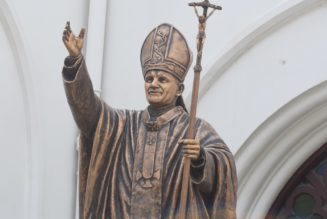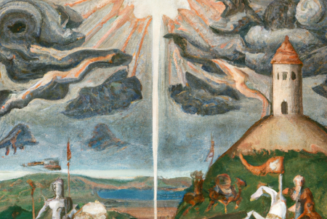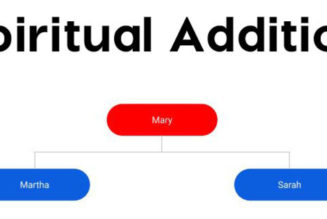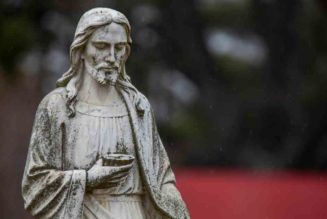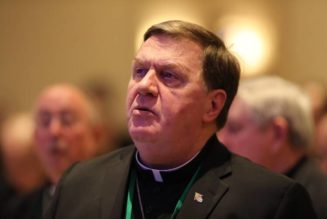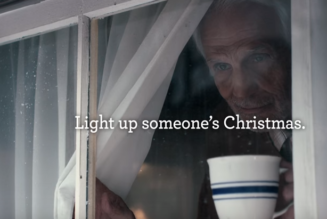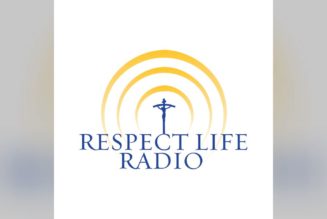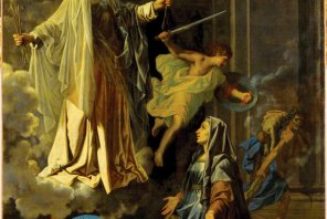By Peter Wolfgang ( bio – articles – email ) | Oct 18, 2024
To me, October 31st is Halloween. No, not the gruesome Halloween. Not the celebration of the occult that our culture has increasingly leaned into since at least the 1990s.
October 31st is, rather, the more innocent Halloween of my 1970s childhood. An opportunity for treats, not tricks. A fun time for our youngest, still in grade school, to dress up in a costume that gets no closer to the occult than, say, Casper the Friendly Ghost.
And most importantly to our family, it’s All Hallows Eve. The first day of a mini-Triduum that carries into All Saints Day and All Souls Day. A sacred time to think about—in a good way—what lies beyond.
For some of my Protestant friends, though, to say the very date “October 31st” out loud, well, them’s fightin’ words. October 31st is Reformation Day. The date on which they celebrate Martin Luther saving the Gospel from the corrupt institution that hid it away from its deprived members.
Now, I fight for a living. But when it comes to Evangelical Protestants, I’m a lover, not a fighter. And what I want to say to my Evangelical friends, whom I love, is this.
The Reformation is over. Come home.
The Reformation ended 25 years ago, when the Catholic Church and the World Lutheran Federation signed the “Joint Declaration on the Doctrine of Justification” in 1999. The World Methodist Council, the Anglican Consultative Council, and even the World Communion of Reformed Churches all affirmed the Joint Declaration by 2017.
Peter Kreeft’s analysis
That the Joint Declaration spells the end of the Reformation is not an idea that originates with me. It was the great Peter Kreeft, an author beloved by Catholics and Evangelicals alike, who said so in his remarkable little book, “Catholics and Protestants: What Can We Learn from Each Other?” Perhaps not coincidentally, Kreeft’s book was published in 2017, the 500th anniversary of the Reformation.
Kreeft calls the Joint Declaration “the greatest ecumenical achievement in the five hundred years since the Reformation” because “by far the most important religious difference between Protestants and Catholics has essentially been overcome.” Says Kreeft, “Goliath is slain; it remains only to slay the other, smaller Philistines.” We, Catholics and Protestants, both believe that the Gospel is “the Good News that we are justified by faith in Christ, and not by works of the law.”
This is why Kreeft quotes the Protestant writer George Marsden, who first declared “the Reformation is over.” Questions like sanctification and the relation between the Church and the Bible remain. But as Kreeft writes, “these issues can in principle be resolved in the same way as the justification issue was resolved: by mutual listening.”
The rest of Kreeft’s book is a model of exactly that mutual listening. “The main reason there are so many ex-Catholics is that they never discovered Jesus Christ in the Catholic Church,” Kreeft writes. “Protestants need to learn Lessons Two through Twenty-Two from us, but we need to learn Lesson One from them.” The secret of true—not false—ecumenical progress, says Kreeft, is that “we love each other’s faith in Christ.”
Kreeft’s observations match my own. I am a cradle Catholic with an unusual religious upbringing. When I was a child, my Catholic mother and Jewish father sent me to a Church of the Nazarene Sunday School. As a young adult, I gravitated toward the robust ecumenical vision of Fr. Richard John Neuhaus’s and Chuck Colson’s “Evangelicals and Catholics Together” statement.
A growing conviction
At about the same time as the ECT statement, Catholic World Report published a cover article praising James Dobson, the founder of the Evangelical ministry Focus on the Family, from a Catholic perspective. Reading these things proved a formative experience for me. For the last 20 years—the last 17 as executive director—I have worked for Family Institute of Connecticut, an ecumenical organization loosely affiliated with Focus on the Family.
The Evangelical Protestant influence has always been there in my life—as a positive. It has enhanced my Catholic faith in exactly the ways Kreeft describes in his book.
To be sure, “I believe and profess all that the holy Catholic Church believes, teaches and proclaims to be revealed by God,” as we say at the Easter Vigil. I am not arguing for religious indifferentism. Our differences do make a difference.
There was a brief period in my early thirties during which I engaged in frequent debates in a local paper with an anti-Catholic who published regular diatribes against the Church. Mary, the saints, the Eucharist, and so forth. You know the drill.
In my work on behalf of the unborn and the family, the difference that has most struck me is Evangelical reluctance to embrace Catholic teaching against contraception. It is really the root of every single negative consequence of the Sexual Revolution against which we both fight.
The question is, do these differences make enough of a difference that Evangelicals should continue to separate themselves from full communion with the Catholic Church? Especially if, following Kreeft’s model of “mutual listening,” these misunderstandings too—like the misunderstanding over justification—can be overcome.
For my part, I hope Evangelicals celebrate this upcoming Reformation Day by declaring, with Peter Kreeft and George Marsden, that the Reformation is over. And that they are coming home to the Catholic Church.
Imagine the jolt it would give our culture if we at least moved closer to one another. If, say, the Evangelicals announced they now accept the canonicity of the Old Testament’s deuterocanonical books. The New York Times, for instance, recently looked on with horrified fascination as Evangelical women held an “Esther March.”
Just imagine what the Times would have thought if it had been a Judith March.
I joke! But seriously…
Sound Off! CatholicCulture.org supporters weigh in.
All comments are moderated. To lighten our editing burden, only current donors are allowed to Sound Off. If you are a current donor, log in to see the comment form; otherwise please support our work, and Sound Off!


 Peter Wolfgang is president of Family Institute of Connecticut Action, a Hartford-based advocacy
Peter Wolfgang is president of Family Institute of Connecticut Action, a Hartford-based advocacy 
